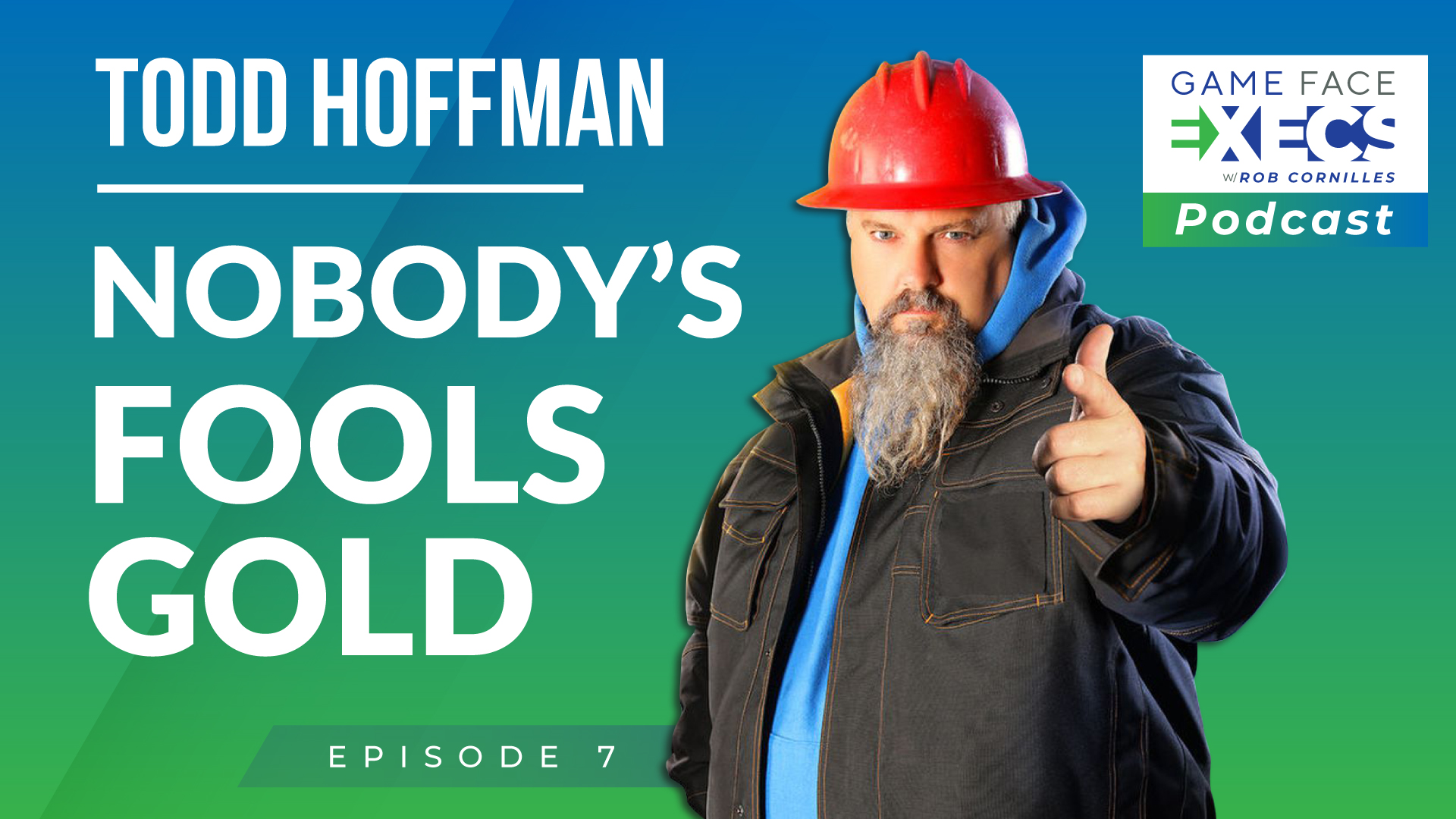
He may have created and starred in the hit Discovery Channel series, Gold Rush, one of the top-rated shows on cable television the last 10 years, but there was no rush to gold for Todd Hoffman. From humble and unconventional beginnings, you’ll see how this week’s game face exec had just enough vision, mixed with a dramatic dose of craziness, to prove he knew more about what the world wanted to watch than high-salaried Los Angeles TV executives ever could imagine. A native of small town Oregon, nobody would have placed their bets on Todd making it on Hollywood. Boy, were they wrong! Join Rob Cornilles and learn about the man behind the beard, where he derives his inspiration and drive, and why he truly does have a “mine of his own.”
—
Watch the episode here:
—
Todd Hoffman | Nobody’s Fools Gold
Everything Todd Hoffman touches turns to gold. It appears that way at least from his hit Discovery Channel series, Gold Rush. Many years ago, tucked away in the small town of Sandy, Oregon, Todd envisioned a concept that allowed him to dig out of the financial and professional hole he found himself. In spite of a Hollywood expert telling him that he couldn’t do it, he became one of the biggest reality TV stars and producers of the last decade. You’re about to get a behind the scenes look into the reality that is reality star Todd Hoffman, my friend, who went from Sandy to gold.
—
I’m here with Todd Hoffman. He’s one of the most recognizable faces on cable television for many years because he is a self-made celebrity. When I say self-made, this is a man who put it all together from the beginning. Now, he has a fan base that gets bigger and bigger every year. He has proven to be not only a great visionary and an innovator, but an entrepreneur that people are always seeking advice from and wanting him to get involved in their ventures because he’s proven that he knows how to do it. Todd Hoffman, welcome to the show.
Thanks for having me. I appreciate it.
You’re in your home in Oregon. That’s where you and I met was back in Oregon because we’re both born and raised Oregonians, not too far from each other. We met later in life as professionals. I want to let the audience know that you and I have been friends for many years.
Is part of your sales tools to make people feel good because you’re doing it?
You want to be the salesperson that people love.
I see all the sports stuff behind you. This is a challenging time for the sports industry. I know you’re still being successful with your company because I’ve been following you, but for a lot of us guys that like sports, it’s confusing. We don’t know what’s common. It’s scary times.
I don’t think there’s anything like this in the history of sports. We’ve had wars, 9/11, and other civil unrest in cities. We had two that blows to the gut in 2020, the pandemic which is creating all kinds of uncertainty, and in some parts of the country, we have demonstrations that are right downtown where a lot of these sports venues are located, which make it difficult to promote family entertainment.
Thankfully, those two don’t ever touch because I’ve heard that if you’re protesting that the virus won’t spread. That’s what I’m hearing. It doesn’t spread if you are protesting and it only spreads on your Memorial Day.
Readers, if you ever want to have a long conversation with Todd, he’s got some opinions on politics. They’re always fun conversations with you, Todd. You are from Sandy, Oregon. You put Sandy on the map. If anyone’s ever been to Mount Hood, Oregon to go skiing, they have to go right through Sandy.
[bctt tweet=”The harder you work, the luckier you get.” username=””]
With that little tourist trap, that slows you down and then you have to stop and buy either Joes Donuts or the Shell Station burrito. There are all kinds of little tourist traps on your way through. We slow you down, try to get some of your money on your way through. That’s what we do.
There’s always a great Dairy Queen too. What is Jane’s place called?
You’re talking of Calamity Jane’s but I don’t think it’s in business anymore. They went a little downhill on the burgers. Their milkshakes are great.
Let’s talk about the thing that most people are interested in when we talk about Todd Hoffman and your background and that is the making of Gold Rush. It’s 9th or 10th season in 2020?
It’s ten. I retired 2 or 3 seasons ago. I did about eight seasons with it. I still get paid for the show because I’m the creator of the show. The biggest show in the history of one of the biggest media companies in the world was created by me in Sandy, Oregon. Having said that, it’s not that I’m this great television mind. This was the first show I’ve ever got on the air, but it shows that the everyday person has the opportunity now to reach out and do certain things like that. I attribute a lot of that to some of the choices that I made, but also to my faith and the idea that I believe was brought to me by God.
A lot of people don’t believe in God and it’s weird to say these things. I’m not that corner street preacher, but that is the truth. Regardless of how much billions of dollars and discoveries made on my idea, at the end of the day, it was not created by them. It was not created in New York or LA, in a small town of a chubby kid with a dream, which is cool because it does give people hope that they too can do certain things, even in Hollywood and even anywhere you can do it. If you make the right decisions and put in the right principles and then also, you’ve got to have a little bit of supernatural help or be extremely lucky. I’ve found that the harder you work, the luckier you get.
Let’s talk a little bit about the origination when you talk about you got some divine help along the way. First of all, weren’t you in, I won’t say a bad place, but around 2008, when the economy went south, you had lost a lot of the business that you were involved in then, which was in the aviation industry. You were forced to start thinking about the next steps.
I was thinking about the next steps. I still live at this airport. I was able to hold onto this airport because of Gold Rush. Things weren’t going good. People were losing hope. All the money was locked up, everything was down, big time recession. I went out, took the last bit of money I had and put the show together. I did not go through Los Angeles, which is the hub for reality TV because you got Orange County Choppers, Monster Garage and Deadliest Catch. Certain shows that were all created and controlled by a few people down in LA, the gatekeepers like in sales. Sometimes you get these people that have a monopoly on certain things.
I went around the horn. I went and brought in a production company out of London. It’s a little tiny company that is now sold for hundreds of millions of dollars on the back of the Gold Rush. They were able to help me formulate and I was able to quickly come up to speed and learn how the game goes. We came through the Discovery Channel from Europe. We were able to bypass that LA syndicate and come in from a different angle. When I do sales with any kind of company, I always look for, “Is there a crack in the side window that I could sneak through?” You used to work with some of these big mining companies. I don’t even know if you know it, but I’m setting you up because I’m going to piggyback. I need some knowledge that you have because of this new mining product that I have. I need a little bit of help. We’ll talk about it later, but that’s the thing is always look for the opportunity on how you can go about it a different way so that you’re in the niche.
I’ve always made money in the niche. If you’re in the stream with all the other salmon and you’re new and this little tiny salmon, there’s a good chance you’re not going to make it up that waterfall or grabbed by a bear. You’ve got to find a different angle and a different approach and that’s what I did. I’ve always been able to do that. That’s why I was a decent point guard in college is that I think I’m always looking for that other way to score or whatever that’s outside the norm.

Gold Rush: If you’re in the stream with all the other salmon and you’re new, there’s a good chance you’re not going to make it up that waterfall. You’ve got to find a different angle and a different approach.
I know you’re the same way and that’s why you’ve written your book. I know that that’s what a lot of your principles are about is to give those people that advantage to try to get around the mainstream. That’s how I got Gold Rush started. I went through England to a little company and Discovery Channel and sold the show. It was written in an unorthodox way, in a niche way and we went around the monopoly and through the side door into Hollywood.
You’re a disruptor.
I’m a disruptor since the day that my teacher said, “Todd, you’re disrupting the class.” I was like, “You’re right.” When everything is going smooth and I’m trying to figure out a way, it’s like, “How do I break up this monopoly a little bit?” I guess I am a disruptor. I know all these people have all this lingo nowadays, “I’m a disruptor.” It’s like, “No, you’re not. You look like the other guy that said he was a disruptor.” There are guys like me, “We are disruptors. We’re lucky that we’re not in jail. That’s how disruptive we are.”
Can we get some more detail on how you approach that production company? You didn’t have a track record of being in showbusiness or producing shows. You would think that most people, if they got a call from someone like you, whose name they’ve never heard from a town in a state they’ve never been to, they would tell you, “Get lost. Don’t waste our time. We’re struggling enough as it is. We don’t need to voluntarily bomb on our next project.” You had to have said and done something, a tactic that you used. If you could share any of those details with us, that’d be interesting.
Number one, I presented them with an opportunity that they’ve never heard of. Number two, they believed in me that I was going to accomplish that goal and that I have enough money to do that, barely. I was too stupid to know that I didn’t. You can look back through this. They go on these things and talk about how great they were putting the show together. I had to force them to come and do this teaser. The teaser is about $10,000 to $15,000 investment. You have a bible of the show that you write out and then you have a teaser. That is your calling card to all the networks. They look at this teaser, its timing. We got a recession, gold’s taken off.
You’ve got this guy that’s going to throw caution to the wind and go mining. It’s got to be relevant to what’s going on and you’ve got to be convincing that you are going to do exactly what you said you were going to do. When I forced them to fly all the way over here because I told them and I have an email chain that says, “If you don’t show up next week, I’m picking a different production company.” I threatened them. They showed up and they watched me drop an I-beam right across my dad’s Mercedes. They knew right then and there, “This guy is not playing.”
I didn’t lose it. They’re like, “What are we doing here? Are we going to do a documentary or a reality show?” I said, “I’m going to drop that I-beam right across Jack’s Mercedes-Benz and you tell me what you think we’re going to do.” They’re getting their cameras ready. We shot a teaser and put it together. The teaser was phenomenal. That’s our calling card. Everything was right. Timings and teasers are right. Several networks want to buy it. We picked Discovery Channel for one simple fact. They’re a big company and they have more money and away, we went.
In the first year, we lost money. In the second year, I lost money. In the third year, we’re coming out of the hole. In the fourth year, then the machine’s going. You have to be dedicated and willing to go that to the 100th mile and get it right. Stay late. Do all the things that a small business does. Sacrifice and you’re the 1 in 10,000 TV shows that makes it. The odds are not in your favor on TV. I can do it again, but that’s only because I know what I’m doing. It’s hard.
The first reality TV that went big, I’m thinking about Survivor, Mark Burnett. I know you’ve had some dealings with him in your career. Is reality TV like professional wrestling?
Some of it is bad. In the mining thing, is everything real? It’s not 100%. The cameras aren’t always on and the sound is not always working. You’ve got to connect the dots. Is it all fake? It’s not all fake either. To glue a television show together with a story and to follow the storylines and things like that, you do have to connect the dots. I never said it’s 100% real. It’s not. When I watch what’s going on now in all these other shows and stuff, it’s like I can tell if these guys are almost reading their lines. It’s bad.
[bctt tweet=”You’re not a disruptor if you look like the other guy who says he’s a disruptor. ” username=””]
I’m going to try to relaunch in the summer. I’ve had two networks looking at it. I’ve never been able to close the deal because I’m not willing to go back on regular terms. When you are a man of faith or you have something to say and you don’t care about being famous. You believe that you’re going to die and go to heaven and stand before God. You can’t just go on TV and do what the networks would love to see you do because morally, you can’t do that.
If I come back on TV, it’s going to be on my terms and they don’t want to give you your terms. They don’t want to give you control over the edit because maybe you feel like you need to say something in there like, “I’m sorry. Maybe I need to pray right now. I feel broken. I want to pray to God.” The world doesn’t want to go into those types of areas. I’m not going to go back on TV unless it’s on my terms. It’s hard to do business on your terms. I know you’ve experienced that. You tell me how do you do as a man that has faith if it gets hard to do business out there. Reality TV is no different. It’s a lot worse.
You said at the outset here that you felt that there was a little bit of divine intervention to get you where you are, whether it’s inspiration or revelation or an impression that you had. If it’s not too personal, can you help us understand what that looks like, feel like and sound like when you feel like, “I’m being directed to take this particular route right now?”
I don’t know, to be honest with you. I’ve always wanted to know. I’m an Evangelical Christian. In this world, there are all kinds of denominations. There are people that are super Pentecostal and they come to me all the time and say, “God told me this about you.” I always take that with a grain of salt because if God was telling some guy about me, why didn’t he tell me directly? I do have several things that people have come up and said prophetic words. I take it all with a grain of salt because I’ve been walking with God since I was young. I’m no super Christian. When people put themselves on a pedestal, you’ve got to understand one thing. For all who have sinned and fall short of the glory of God, nobody is better than anybody else. We’re all children of the Lord.
I came out of a real tough time with my marriage. I prayed and asked the Lord for guidance. When I got the idea of the Gold Rush, I knew that it had something to do with the Lord. I can’t put my finger on how or why? At that time, I knew. I think God talks to all of us, but I think he talks to all of us differently. In the Bible, it’s happened a lot of times. Sometimes in dreams and sometimes He had an animal talk to somebody. God works with each of us differently. At that particular time, I knew that I was going to create this show. I knew that it was going to be successful.
I went to my pastor. It was heavy on me and I said, “I’m going to tell you something that sounds crazy. I’m starting a TV show and it’s going to be huge. I don’t know if I’m prepared to deal with this.” He looked at me like, “You are insane. It’s never going to happen.” Everybody’s journey is going to be different. The one constant is that I follow the bible. God is the same yesterday, today, and tomorrow. He is my hope. It’s not gold. You’re going to die and stand before God. All the things that we’ve sold, the things that you and I love to do, we love to sell.
Your passion is selling, Rob. Your business is built around it, but you and I are going to die and stand before God and we’re not going to be able to take any of this with us. For me, it was in how I did my TV. That’s where I felt in a lot of ways in Gold Rush, I did very well-represented in the faith. In a lot of ways I didn’t. I looked back or the edit got it twisted and they twisted things. They make me say things I didn’t say and inferred things. That’s what frustrated me about the business is they want the lowest common denominator. The viewer wants this bloody payoff.
They want to see me berate somebody, leave them bleeding in the ditch and move on to the next victim. That’s what you see in Gold Rush from some of the characters. For me, I can’t do that. I can’t have faith and leave a guy. One hundred seventy million people worldwide would watch me and they love us to tell a guy he’s a loser. He asked to leave the show, go back into his real-world and his character is damage. In reality TV, that’s what it’s based on. It’s based on watching somebody puke and get some sick thing out of it. There’s this other element. They’re encouraged by reality TV. I see a guy trying hard. I see a guy trying to make it and fail. How does he deal with this failure?
These are the things that I want to portray. There’s a reason why I’m not on TV for the last many years. It’s not because I haven’t been trying to get my show back on. It’s that I’m not allowed to put my show back on the way I want to put my show back on. I’m not going to compromise. I’m debt-free. I have the money. I don’t care. I’m being a good husband and a good father the best I can. I’m living life. I’m doing good. If the Lord gives me another opportunity to bring Hoffman Gold back on the air, it will be because the world needs to see it or the world needs to see something that I’m going to bring.
I’m crazy enough to do it. I’ll live in a trailer for six months and kick butt and dig raw gold out of the ground. It doesn’t matter. I’ll do whatever it takes. If there’s a message that I feel like God wants me to bring to the world through that medium because there’s no other medium in the world that you can reach. I used to reach 170 million people. There’s nothing else out there that could go, “I was in 120 languages. My fat butt was in Japanese and Chinese.” There’s no other medium that can reach that many people. It is special, but it can be used for evil too. There are a lot of shows out there that are not good for you to watch.

Gold Rush: If the Lord gives another opportunity to bring Hoffman Gold back on the air, it will be because the world needs to see something it’s going to bring.
I remember I was able to watch you on set. You and I made an attempt at a project together. Through those experiences that I had with you, a couple of things that are worth noting for your fans and that is that first of all, you would often tell me that if there’s no conflict, then there’s no show. If there’s no conflict, then the producers aren’t interested. It seemed like every episode had to have a conflict and maybe end on a cliffhanger. I’d like to bring that idea into the world of business. Where there is conflict, there’s no business, no partnership, no relationship and no sale.
It’s a different dynamic between entertaining people and developing a real relationship with them where there’s a transaction made where both sides are happy. Hearing you talk reminds me about that lesson you taught me about reality TV. The other thing is that it was hard work. Though you were in show business and are in show business, it’s not glamorous. I remember being with you a week or so before you’d have to go back out on the mine site for the next season. You would go out months before we started seeing the episodes on television. To see you leave, I could see it in your face that, “This is hard to go out there in the middle of nowhere, leave my family for the most part, live in a trailer. I may not make much money doing it this year. I’m taking a big risk.” It’s not just Todd gets to have a green room and people are feeding you grapes in between takes.
It’s hard too because you have to worry about the bills, being a husband and a father. You have to run the show and the mine. You have personnel issues. Everybody is fighting and then you’ve got to get the goods. It’s either high or low, but if it’s in the middle of it’s okay, they turn the channel. You’re either head to the top or to the bottom and you’ll see a zigzag through the episode. You wonder how that works. There’s an equation for that. When you’re going in for sales, you better have your game face on.
There’s an equation that you have built with your company that results more than not into a successful sale. Getting that game down and solving an issue for a company, at the end of the road, it’s the X and O’s. Does that save them money? Does that help them sell more seats? What is it that’s going to help them? Are you adding value or not? With the Discovery Channel, I went through one president after another, but what I was always known for is always give them the goods. I’ll stay longer, shoot longer. Whatever it is, I delivered you a good episode. It’s 165 episodes is what I did. I learned a lot about TV, episodic structure, how it all goes together and everything.
To be able to look under the hood on something like that, to be able to look at the reality TV contracts, to go in and fight them for your pay is fun. It’s all good, fun and very interesting business to me. People come to me all the time. They pay me money to sit. I give them three hours. They pay me thousands of dollars. They sit there and I explain to them how reality TV works. They’re taking notes the whole time because I’m ADD and I’m going through it. “This is how it goes. This is what’s going to run into here. This is out of consciousness. This is how they’ll try to get you. Watch out for that. This is your team. This is how many people can be on camera. This is how you do a scene. This is how you do that.”
At the end of three hours, I’m tired. I want to take a nap. They get three hours and, “Get on there. I don’t care. Go back and get on your plane and get out of here.” It’s a lot. I paid in blood, sweat and tears to learn that. Like your book and all the things that you’re bringing to these people, you didn’t just sit there and think it up. You lived it by doing things right. Even you, Rob, with all your fancy hair and everything, you did some things wrong and you learned how do you sell, what is it and what drives it. That’s what’s cool with you and me is that we’re both salesmen.
We’re selling different things. We all endeavor. We all have different styles too. My style, I’ve lost a couple of deals with these TV guys because the first thing you think, I come in. One company has horrible TV shows and I said, “You’re not reaching middle America. Your shows do not reach middle America. What I bring to you is I am middle America. I am your fan base. I am that guy. Who better to bring you the entertainment than a guy from that world?” That offended them because they felt like they grew up in LA and they know TV for a guy that lives in the deep South, that they know what that guy wants to watch.
They bring one goofball show after another. They wonder why they don’t have ratings. I said, “Do you want ratings? Go with me. I’ll bring your ratings because I know what people want.” That’s what’s happening now. We’re in a recession. We have a pandemic. We have civil unrest. If you don’t agree with their method. Everybody’s getting called a racist. My old roommate, black guys got called a racist. My brother-in-law is a teacher, a Democrat, he got called racist. He calls me and like, “I get called racist.” I said, “You’re the least racist person I’ve ever met.” He goes, “I don’t know what’s going on out here.”
It’s a lot of anarchy. It’s scary. I don’t mind a good protest. Everybody’s for a peaceful protest. That’s American. I’d fight to protect that right. When it gets to the point where you’re going to take over public buildings that you don’t own, you’re going to destroy property and people’s dreams, little businesses and things like that, you better have the police there to protect those people. When you walk the police out and turnover our city to people, that is where I have to decide, “What are we going to do about that?” I don’t know. Do we get people together and start a vigilante squad? I don’t know. Let’s hope not. What do you do? Businesses are hurting out here, Rob. It is getting crushed out here in Portland.
Your upbringing has a huge role in the way you look at the world, at your faith and your family. Your dad has played a prominent role in the show. Talk to us a little bit about growing up in the Hoffman home. Did you always have a great relationship with your dad?
[bctt tweet=”When you’re going in for sales, you better have your game face on.” username=””]
My dad came from that era where they don’t talk a lot about it. I remember a lot of times when my dad did things, he tried little businesses and things, and he was a real estate guy. He wasn’t designed to sell real estate. The only guy in my family designed for real estate was my great grandfather, Ralph. My grandfather was a horrible realtor. My dad was a horrible realtor. For some reason, they had a real estate company. They weren’t geared for what their skillset was. That’s huge when you’re trying to put a business together and everything. Growing up with my dad, we were poor. We didn’t have a lot of money. We dug sewers. We had a little excavation company and a little dump truck. We weren’t rich. We were poor.
We didn’t have these big long talks with each other and all this stuff. It was more of an understanding. He was always faithful to my mom and brought us to church. I drowned as a child. It probably explains a lot, but they pulled me out of the pool and my dad recommitted his life to God when I started breathing again. It was a turning point in our life, for his life and he followed God. He was a faithful man. My parents had been married for many years. It hasn’t been perfect. It didn’t matter if red or yellow or black or white. He always helps somebody.
We weren’t raised like some of these guys from a racist family. We are not like that. We love God. We knew we all needed grace and faith. It was a good faith upbringing. My parents took me out of public school. I went into a private school, a little Christian school. There are times we couldn’t pay our tuition and things like that, but I knew that if I could make it to a certain point, I was going to be a business guy and bring in the money. The most money my family ever made was when we started doing business.
Did you always want to be an entrepreneur or did you want to be a television star? Which came first?
I like the medium of TV. I don’t like being on TVs. I’m not a celebrity. I’m a D lister. I don’t like that part of it, but I do like being able to represent some of the cool things about being a Patriot, about being a man of faith and loving your wife. That is cool being able to represent it. It is cool in a business entrepreneurial sense because I can go in to access people and business is easier. That has been fun. Let’s be honest, people say that being rich isn’t everything, but having money is a lot better than being poor. I don’t care what these try to tell you. That’s not good. Being poor sucks.
You get out there and you try to slay the dragon just like you’re doing and I’m doing to try to provide for our families. I think there’s a deeper root. I know you feel it too is to help others. I know you’re a professor. Being able to help other people and bring them up, give them the tools to be successful is fun. There’s something cool about it. It feels like you’re living out your faith when you do that. People will come to me and they’ll go, “I need an opportunity. I don’t get any opportunities.” I say this, “If the opportunities that were given to you are equal to the opportunities that you have created for other people, how many opportunities would you be worth?”
They look because they think about themselves and their problems and they’ve never opened the door for one other individual. They sit around worrying about how much money they’re going to make, but they’ve never reached out to help anybody. They’ve never tried to get another guy a job. They never called their friend to get them work. I do it all day long. People come to my house all day. The guy came to my house and I teach him how to shoot his gun. We also talked about politics. He wanted to know if I should invest in this movie that he’s got going. I sent him out to my shooting range. He’s scared of what’s going on.
I helped them with safety. I told them how to protect his house. I also helped them with the movie. That happens to me all day long. People come to me all day long because they know I’m here to help them. Because of that, I know God sees my heart. Opportunities come across my desk all day long, but I’m also busy helping other people. There’s got to be a godly principle and something about that in the Bible. I can’t pull the verse right now, but I guarantee you that my opportunities are in direct correlation with the opportunities that I give other people and the number of people I help. I don’t know for sure, but that’s how it works with me. I would suggest because if there is a God and He is seeing your heart, who does He want to help?
Does he want to help the guy that’s out there trying to help other people? I think He would. That’s a philosophy in investing and entrepreneurship. It’s an investment in sales. I would help that company whether they buy my equipment or not. If you are sold out to help that guy, maybe there’s a competitor’s equipment in that particular situation that works better and you look the guy in the eye and say, “Buying our stuff isn’t the best. In your situation, you need these guys.”
That principle you’re talking about, I believe the same is true that when you help another person, you are, by extension helping your maker. He recognizes that because if we do believe we’re all in this together and that we all come from the same place, it would stand a reason. When we’re helping each other, we’re helping our brothers and our sisters. There’s a common father that we share and He likes to see that. He takes care of those who take care of others. That’s a good principle to live by and you become less insulated. I have people in my own life that are struggling now with whatever it could be. It’s a real struggle to get outside of yourself because you think that’s counterintuitive, “Why would I spend time helping other people when I’m struggling myself right now?” I think that principle still holds true. The more you seek to lift up other people, the more you find that divine help lifting you up.

Gold Rush: If the opportunities that were given to you are equal to the opportunities that you have created for other people, how many opportunities would you be worth?
It’s hard to be depressed when you’re in service for others. That’s the first thing people are coming up, “I’m getting depressed.” “Here’s what I want you to do. I want you to volunteer somewhere.” They’re like, “What do you mean volunteer? I want to sit around being depressed.” “You should volunteer. It’s hard to be depressed when you’re volunteering and helping other people.” They can get outside themselves.
As you see their challenges, sometimes yours don’t look so big by comparison.
He can then start seeing some of the ways that you can be thankful.
You’ve used your influence, your treasure to help a lot of people, especially those who are recovering from some type of addiction. Can you share a little bit of that with our audience?
I had a group of guys that I’ve been friends with and they’re all in the recovery space. They’re counselors and they’re all in recovery. They came to me and said, “We want to start our own treatment center.” I’m like, “How do we do this?” They said, “You’ve got to do this. You’ve got to hire this.” I said, “I will throw in with you guys.” I put up the money and we started a treatment center. Immediately, we got sued. We’ve been through 1 or 2 lawsuits. It’s been super hard. The first billing company we had went sideways on us and we had to get a new billing company. We had to put more money. It was difficult.
A dad comes up to me and said, “I need to talk to you.” He looks at me in the eye and said, “You saved my daughter’s life. She was on heroin. She came into the clinic. You spent time with her. You loved her and you saved her life. I want to tell you, thank you. There’s no other way I can repay. I want to tell you, thank you that you saved my daughter’s life.” I put it all into perspective because I have a 12, 18 and 21-year-old. I look at this as helping people, but it’s also a business in saving lives. It’s like, “I can’t not make this successful regardless of what happens or how many times this happens.”
That’s when we said, “Come hell or high water, Sober Living Oregon Recovery Center will stay open no matter what. We have the best doctors and best counselors.” We are the second-largest treatment center in all of the state now. We’re saving people’s lives. I have 53 patients now fighting for their life. We house 160 people of 40 women and 120 men. After they’re out of treatment, we get them jobs. It’s unbelievable. All my partners are rough and tumble. They’ve all been in jail, but we have a superstar team. Our doctors and counselors are the best.
It’s like, “I’m not even in recovery. I don’t drink. I don’t do anything except for overeating.” It’s an honorable business. It’s tough. There’s a lot of shady stuff and hurts. You’re dealing with darkness and people that are dirty. People and their problems are dirty and it’s hard. It takes a toll on you when it’s hard. It scars you. Sometimes doing the good work, the frontline guys are the guys that are the toughest and they’re the guys with the most scars. They’re not the prettiest guys.
I could take my staff. We would go into a church and somebody said the F word. I’m like, “We’re dirty. We’re hard core, but we save lives. We’re frontline guys. We’re doing it.” I was able to get involved in that. If I do my new show, I’m going to have people from recovery on the team up in Alaska with us digging. That’s part of it. I’m super thankful that they asked me to do it. We’re not the best treatment center in the world. We’re still learning. Now, we’re doing well. Our billing comes right out of your neck of the woods. All of our billings are done there in Salt Lake and I’ve been cool.
That’s commendable. More power to you and those people work with you on that. You talked about some of the people that you may attend the church together and they’re a little rough. You’ve always had a persona of looking a little rough. Part of that could be the character that you play on television. I don’t mean to say it’s not Todd Hoffman, but in business, we’ve often been told that, “You have to look the part,” whether to get the job or to get the sale. Can you talk a little bit about that? How has that worked for you in your career? You’ve made a conscious choice that you yourself are a physical brand. When you see Todd Hoffman, he’s recognizable. You and I have eaten together many times in public places where people have immediately recognized you. You’re hard to hide. Is that a conscious choice that you’ve made?
Once you get on TV, you’ve got to stick with what you look like as best you can. I’m overweight. I’m bald. Luckily, I’m good looking enough to pull it off. The thing is like, everybody, when you think of a sales guy, you’re tall. You got to have these certain things and I don’t just believe that. A lot of people are forgettable. There are guys who got to me and I don’t ever remember even meeting that guy. They’re having a big old conversation, “We hung out for two days, I guess.” I’m like, “That guy is forgettable.”
[bctt tweet=”People say that being rich isn’t everything, but having money is a lot better than being poor.” username=””]
In reality TV and in sales, they either love or hate me, but you don’t want them to ever say, “That guy was okay.” I’ll give you a sales beat with that and I won’t say who. It was a big rental company that starts with United. I went to this meeting. I was there with my buddy and he was selling them equipment. They buy millions of dollars. All this guy at this round company is doing is he’s making fun of my buddy. I’m there with him. They’re making fun of this guy. He doesn’t want to say anything back because they buy millions of dollars’ worth of stuff and they’re inappropriate.
I’m watching him and whispered, “Tell that guy where to stick it.” He’s like, “They’re our biggest customer.” I go, “Why are you taking this from him?” You never want to be in that position. I would rather go ahead and say, “Tell that guy where to stick it,” and at least that he respects you. When you go to negotiate on the next deal, you might have a little bit of leverage with the guy, but you never want to be in that position. I feel like it’s better to not be forgettable. Come in and be fun and like, “I know I’m here to sell this, but what’s going on with this, that and the other? Am I right?”
I’m like, “Let’s go back to the presentation. I wanted to tell you guys that thing. I just had to get that off my chest.” Everybody’s like, “That kid is a good guy. I like that guy.” It’s better to be not forgettable. If you’re coming in and you’re thinking that you’re stuffed. If you think that there’s not another company that’s got the exact same stuff as you or is coming up behind you and he’ll do business with you. Do you want to know why he’ll do business with you? It’s because he likes doing business with you. I put a pump company in Gold Rush and the owner came running over one day and he had a $1.2 million purchase order.
The guy said he was going to go with Gorman Rupp the big boys or he’s going to go with X, Y, Z pump company which is the little guy that I put in the show. He said, “I’m going to go with you because I like Gold Rush and I love the show. It’s my favorite show. I should probably order from Gorman Rupp but I’m not going to order for Gorman Rupp. It’s because you’re in my favorite show. I like you guys.” They like doing business with you. If you’re going out there, you make it an event. Make it so that you’re not forgettable because they get lots of people at them all day. They’re looking at their numbers. COVID has kicked them. They’re looking in there and like, “We’ve got to cut back here.”
When it comes down to you, “What’s that company with that guy? I don’t remember that guy. Let’s cut it down.” They don’t cut Bob at this company because he’s the funniest guy at the party. He’s the guy that shows up and always gives us the best service. When it comes down to two things on the line item, I’m going to cut the guy that he doesn’t like to hang out with. I’m sorry. It has to do with relationships. In my opinion, it’s not always that way, but if I’m about ready to build another building and I’m getting bids from a couple of different guys. There’s this one guy and I know he’s going to be more money, but I’ll probably go with him because I get to hang out with them for three weeks.
He’s going to be at my house building this big building. I get a flat out, go out there and we get to shoot the bull together. I’ll go with that guy because I want to see him successful too and get the sale. I’m sure I like being with that guy. We had the best time and it’s not always dollars and cents. It’s relationships. I’ve seen that over and over with the guys they like doing business with. Do you believe that, Rob? Is that part of your book?
Shameless plug right here, How to Become the Salesperson People Love. It’s throughout the book. You’re going to have to read the whole thing.
I don’t read books. I write books.
Put some earplugs in and I’ll send you the audio version.
I’m ADD. I’m not normal. What would you say is the most important thing that you think maybe I could pick up from your book?

Gold Rush: Whether in reality TV or in sales, people will either love or hate you, but you don’t want them to ever say, “That guy was okay.”
We have a lot of methods and techniques, but the most important thing we talked about is the principles of selling. Here’s a take-home principle for you, Todd. You know this because you work in the mining business. You’re always buying equipment. You and I have been a part of those kinds of transactions together. More than the actual product, people want to buy the results the product brings. You don’t care what brand of excavator or what kind of bucket you have at the end of that excavator, what you care about is the results it produces for you. Is it going to be more efficient on your machine? Is it going to save you money? Is it safer to operate? Do the parts last longer, so you don’t have as much downtime? Those are the things that matter to you.
Which brand, which color, where it’s made, whether it’s Topeka or Malaysia, you don’t care. All you care about are the results you’re going to get from it. As salespeople, that’s what we always have to keep in mind. Don’t spend all your time talking about your product features, your SKUs and all those kinds of things, because in the end, that’s not as important. What matters is the results your product brings. The good thing is that if you talk about results, you will get fewer objections because nobody objects to results, but they can object to the product all day.
I was correlating now with what I’m doing now. I might read your book instead of saying, “I’m going to read your book.” I’ve got a lot of issues.
You’ve given us a great time and wisdom but you’re a risk-taker. You know as a fellow entrepreneur how much I admire you for that. To do some of the crazy things that you’ve done and turn them into success, you’re one of those guys who’s not going to take his great ideas to the grave with him. Because when you have a great idea and even if it’s not great, you go, you execute and try. There’s less than 1% of the population like you. That’s why I admire you. That’s why you’re my friend and I’m grateful that you joined us on this show.
Thank you, Rob. Thanks for having me. I’m looking forward to your book. I appreciate it. I always love talking to you about business, sales and everything else.
Thank you. We’ll talk soon.

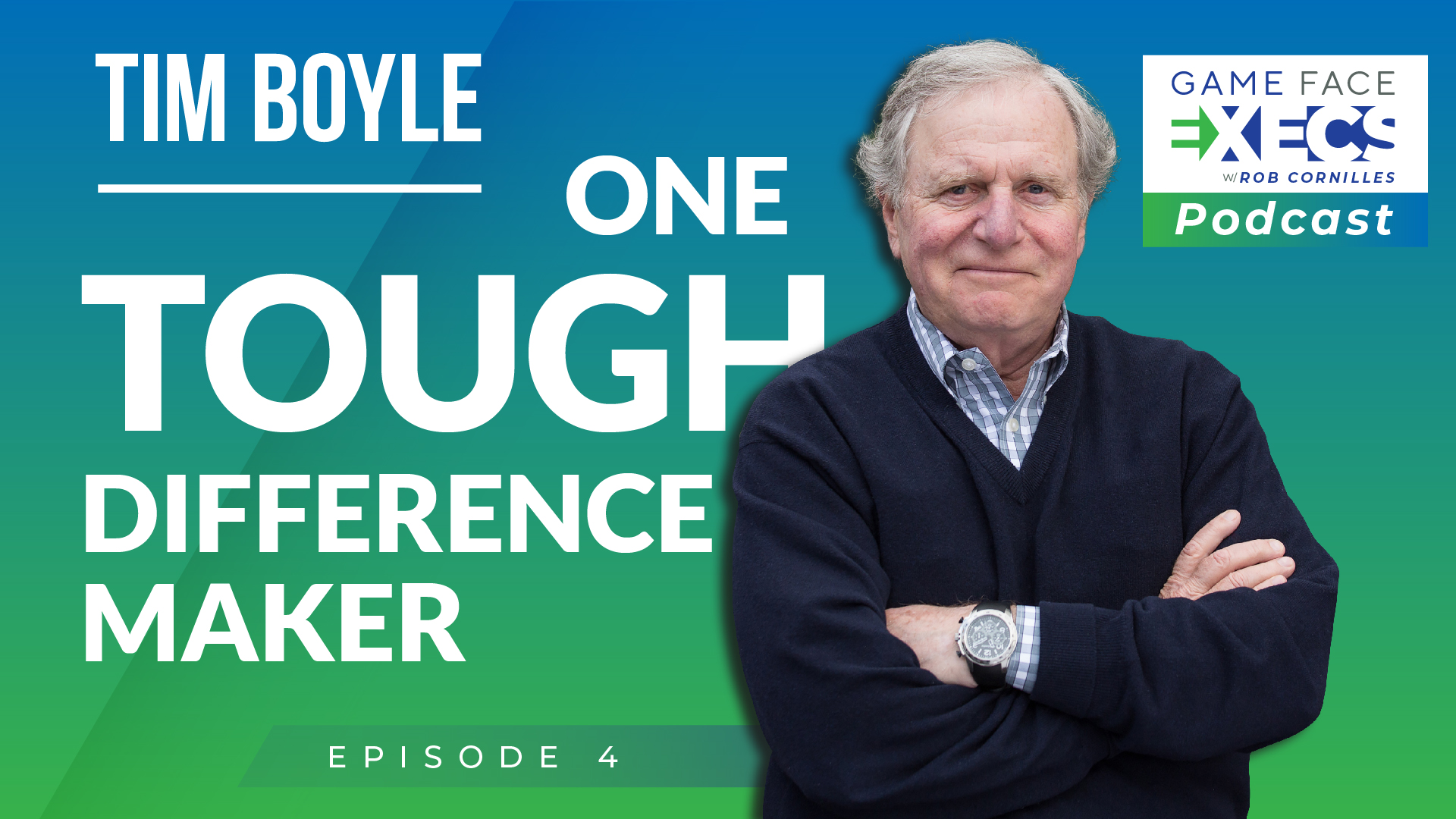
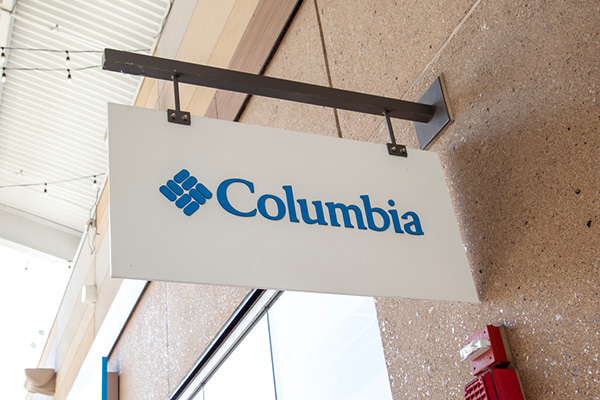
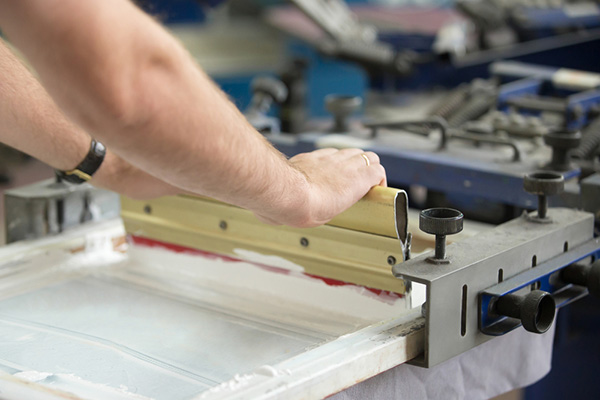

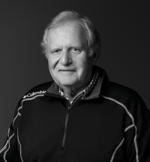 Tim Boyle has served as chief executive officer of Columbia Sportswear Company since 1988 and reassumed the role of President in 2017, which he had previously held until 2015. Tim was appointed Chairman of the Board in 2020. He oversees operations of the active outdoor company from its Portland, Oregon headquarters.
Tim Boyle has served as chief executive officer of Columbia Sportswear Company since 1988 and reassumed the role of President in 2017, which he had previously held until 2015. Tim was appointed Chairman of the Board in 2020. He oversees operations of the active outdoor company from its Portland, Oregon headquarters.